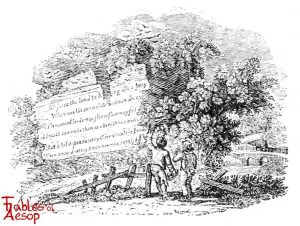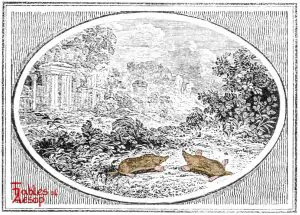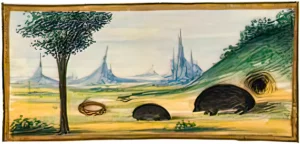A young Mole insisted he could see though blind from birth. His Mother put some incense before him and he knew not what it was. Not only blind but no smell.
Nobody would notice imperfections if people did not try to conceal them.
A Mole, a creature normally blind from birth, once said to his Mother, “I know I can see.”
His Mother placed a few grains of strong-smelling frankincense in front of him and asked, “What is it?”
The young Mole said, “It is a pebble.”
His Mother exclaimed, “My son, I am afraid you are not only blind, but you have lost your sense of smell as well.”

Aesop For Children
A little Mole once said to his Mother:
“Why, Mother, you said I was blind! But I am sure I can see!”
Mother Mole saw she would have to get such conceit out of his head. So she put a bit of frankincense before him and asked him to tell what it was.
The little Mole peered at it.
“Why, that’s a pebble!”
“Well, my son, that proves you’ve lost your sense of smell as well as being blind.”
Moral
Boast of one thing and you will be found lacking in that and a few other things as well.

Townsend version
A Mole, a creature blind from birth, once said to his Mother: “I am sure than I can see, Mother!” In the desire to prove to him his mistake, his Mother placed before him a few grains of frankincense, and asked, “What is it?” The young Mole said, “It is a pebble.” His Mother exclaimed: “My son, I am afraid that you are not only blind, but that you have lost your sense of smell.

Samuel Croxall (The Mole and her Dam)
THE young Mole snuffed up her nose, and told her Dam, she smelt an odd kind of a smell. By and by, O strange! says she, what a noise there is in my ears, as if ten thousand paper-mills were going. A little after she was at it again. Look, look, what is that I see yonder? it is just like the flame of a fiery furnace. To whom the Dam replied, Prithee, child, hold your idle tongue; and if you would have us allow you any sense at all, do not affect to show more than nature has given you.
THE APPLICATION
It is wonderful that affectation, that odious quality, should have been always so common and epidemical; since it is not more disagreeable to others, than hurtful to the person that wears it. By affectation we aim at being thought to possess some accomplishment which we have not, or at showing what we have, in a conceited ostentatious manner. Now this we may be assured of, that, among discerning people at least, when we endeavour at any thing of this kind, instead of succeeding in the attempt, we detract from some real possession, and make qualities that would otherwise pass well enough, appear nauseous and fulsome. Is it not ridiculous to see an old battered beau put himself to pain, that he may appear to tread firm, and walk strong and upright? A man, defective in his eyes, run against a post, rather than confess he wants a guide? And on that is deaf mistaking every thing you say, rather than you should suspect he cannot hear: yet perhaps these things are done every day; and imitated, in some other affectation, by the very people that laugh at them.

Thomas Bewick (The Mole and Her Dam)
The young Mole snuffed up her nose, and told her Dam she smelt an odd kind of a smell. Bye and bye, O strange! says she, what a noise there is in my ears, as if ten thousand hammers were going. A little after, she was at it again: look, look, what is that I see yonder? it is just like the flame of a fiery furnace. The Dam replied, pray child hold your idle tongue; and if you would have us allow you any sense at all, do not affect to shew more than nature has given you.
APPLICATION
By affectation, we aim at being thought to possess some accomplishment which we have not, or at shewing what we have, in a conceited ostentatious manner. There is scarcely any species of ridiculous behaviour, which is not derived from it; it grows out of folly and insincerity; it derogates from genius; it is the bane of beauty, and diminishes its charms; it is disagreeable to others, and hurtful to the person who uses it; it detracts from some real possession, and makes qualities that would otherwise pass well enough, appear nauseous and offensive; and whoever indulges in it, may be sure to lay themselves open, and call forth the attention of others to notice their vanity. To cure ourselves of affectation, we have only to call in the aids of truth and sincerity, which will cut off the whole train of its follies at one stroke.

Where wealth accumulates, and men decay:
Princes and lords may flourish, or may fade
A breath can make them, as a breath has made:
But a bold peasantry, their country’s pride,
When once destroyed, can never be supplied.
———-
The Deserted Village – by Oliver Goldsmith
(English poet and novelist, 1730?-1774)

JBR Collection (The Mole and Her Dam)
The young Mole snuffed up her nose, and told her Dam she smelt an odd kind of a smell. By-and-by, “Oh, mother,” said she,” what a noise there is in my ears, as if ten thousand paper-mills were going!” And then again, soon after, “Look, look, mother! what is that I see yonder? It is just like the flame of a fiery furnace.” The Dam replied, “Prithee, child, hold your idle tongue; and if you would have us allow you any sense at all, do not pretend to more than Nature has given to you.”

L’Estrange version
Mother (says a mole to her damm) here’s a strange smell methinks. And then she was at it again, There’s a mulberrytree, I perceive. And so a third time, What a clattering of hammers do I hear. Daughter says the old one, you have now quite betray’d your self; for I thought you had wanted only one sense, and now I find you want three; for you can neither hear nor smell any more then you can see.
Moral
Men labour under many imperfections that no body would take notice of, if they themselves were not over-sollicitous to conceal them.

Gherardo Image from 1480
Perry #214


